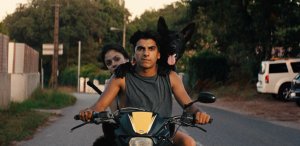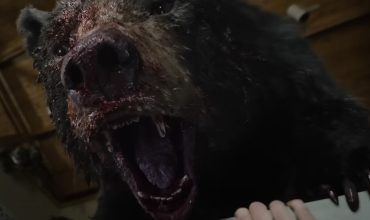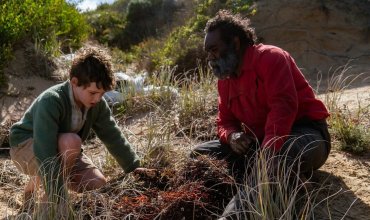Thirteen-year-old Ava (Noée Abita) is on a beachside holiday in the Medoc region, with her mother and baby sister, when she learns that the degenerative eye condition she has been diagnosed with is accelerating faster than expected, and will very soon leave her completely blind. In spite of her imminent disability, Ava confronts her prognosis head-on, exploring her remaining senses and her burgeoning sensuality, as encouraged by her emotional unavailable mother Maud (Laure Calamy). After she crosses paths with the 18 year-old Spanish gypsy and troublemaker Juan, (Juan Cano), by way of stealing his dog, Ava embarks on a series of daring and rebellious adventures, including robbing nudists at gunpoint. Ava was nominated for the Critics’ Week Grand Prize at the 2017 Cannes Film Festival, and is the directorial debut of Léa Mysius.
Ava’s blindness has been described as a critique on contemporary French society’s growing tendency to embrace extremism, and increasing social distress. However, I don’t know enough about contemporary French society to comment on whether this is apparent throughout the film.
The film is best described as a character portrait, a snapshot of Ava’s final summer in the light. It opens to a picturesque beach portrait of bright towels, fat swimmers and frolicking children, and gets progressively darker throughout, eventually disintegrating into disturbing absurdist imagery, with some minor threats of existential dread tossed through, which never re-emerge. Shot on 35mm film, a dying medium, the film is vividly warm and bright, making it more poignant that all this beauty will soon be lost to the young protagonist. The film is remarkable in the sense that it engulfs the viewer in such sensory texture and detail in certain moments.

Throughout the film, there are flickers of Ava’s utter despair, fear and self-pity that is only natural with this kind of degenerative diagnosis, but which she keeps hidden from those around her. There are little moments where we see through Ava’s façade of indifference to the darkness she lives with daily, in particular when we see her recording the hours of daylight she can still see in, before the low light of evening steals her vision, and the slowly closing circle of vision she paints in black ink on the walls. The contrast of black against the richness of the beach becomes an evidently recurring symbol of Ava’s increasing blindness. It manifests in the frightening void that follows her, first in the form of Lupo, a black dog so dark he is simultaneously featureless and mesmerising, and then in the form of the police riders in black.
One of the most sincere elements of the film is the strained relationship between Maud and Ava, wherein Ava does not become the ideal abandoned child, taking on the role of mother to fill her absence. Instead, Ava is almost cold, yet self-assured, and not afraid to speak out against her mother. Mysius manages to capture the fraught relationship between daughter and mother, and Abita does incredibly well in the role of Ava.
The nudity featured in the film is not inherently disturbing in itself – instead it adds to the enticing sensuality of the film and Ava’s exploration of her body’s interaction with the world, as well as encapsulating the awkwardness of early teen romance. What is concerning is the unrealistically developed body of 13 year-old Ava played by 17 year-old Abita (to meet the legal requirement in France), which disturbs the narrative of innocent youthful abandon and disturbingly disarms the audience against troubling age difference between the teen couple.

Ava is a beautiful and intriguing film that has a lot of symbolic potential which is lost in the disappointing resolution. Ava’s own journey is somewhat overshadowed by Juan’s past love affairs, and what starts as a complex character study of a young girl finding her place in the face of a frightening prognosis, devolves into an absurdist out-law adventure of unrequited romance.
I rate this film 6/10.
Ava is playing as part of the 2018 Alliance Française French Film Festival, which is on from 14th March to 4th April, at the Cinema Paradiso, The Windsor and Luna on SX. Click here to find out more.


